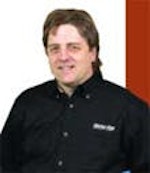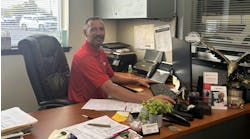Service dealers must acknowledge, solve training problems, says GAAS panelists
CHICAGO –– A panel of service dealers at this year’s Global Automotive Aftermarket Symposium (GAAS) had a few choice thoughts for an audience of industry leaders pondering the future of the aftermarket. Quality parts are a must; homegrown technicians are essential; and continuous training programs are needed for any shop looking to compete in today’s competitive environment.
With all of the service issues the industry faces, the all service dealer panel was timely. With many parts suppliers, WDs and other distribution segments on hand, it was a chance for them to get a firsthand look at the real world of independent shops.
Four shop owners and managers in the automotive service segment took part in the panel — John Francis, Jr., owner, Francis Automotive Services, West Chester, Pa.; Eric Griffith, vice president of the Midwest Zone for Bridgestone-Firestone retail and commercial operations; Mac McGovern, owner, Precision Engine, Oak Grove Village, Ill.; and Doug Moody, owner/operator of an Active Green & Ross Tire and Automotive franchise in Barrie, Ontario, Canada.
Most of the panelists agreed the quality of parts, not their costs, dictates usage. They can’t afford comebacks because of inferior parts and one bad experience could sink a specific part if it fails. Their next stop will be OE parts if this happens.
GAAS is held annually to bring together all levels of automotive aftermarket distribution and service segments for two days of seminars and idea exchanges. This year, more than 400 people, and better than 34 speakers and panelists, attended the event May 18-19 at the Hyatt Regency O’Hare. Symposium Chairman Mort Schwartz coordinated the content and moderated the event.
One of the most appreciated aspects of GAAS is the fact all event proceeds go to scholarships for students who are studying to enter the aftermarket. Numerous awards have been given in past years and the scholarship fund continues to grow.
During the service dealer panel one interesting fact was the view of participants that the Internet is being used for up to 70 percent of all parts purchases. Panelists aren’t buying nationwide, but they are buying from local suppliers with superior websites. They cited the accuracy of parts orders, the shortened time to place orders, and even being able to track when trucks leave to make deliveries as primary benefits of online systems.
As for recruiting technicians, most of the panelists agreed the best method today is to “grow your own.” Even though it takes longer, the results are better.
McGovern pointed out that the biggest dilemma is that shops don’t think they have a problem with training. The only way to solve it, he said, is to develop some kind of benchmarking process within the shop that relates a problem to a solution –– that solution being some kind of training.
“If they don’t get out and visit with other shop owners, with other people within the industry to see what’s made them successful, then they’re never going to be able to relate to the problem initially,” he argues. “And the struggles will seem to be their own personal struggles rather than an issue of a lack of training.
Time to regain control
McGovern believes a paradigm shift is needed for shops to regain some control of the repair process. “We have relinquished control of the sales process to the consumer,” he says. “They come in telling us what they want done and we do that thing. Or, because we’re so technically oriented, we just solve the technical problem and release the car. We’re not even of a mindset to offer preventive maintenance.”
Small, independent shops have to evolve or become extinct, he says. “They are either going to have to downgrade their array of services or specialize. They also have to figure out how to compete at an OE level. And that means building some kind of resource bank,” says McGovern.
According to Griffith, the industry in general spends way too much time talking about nuts and bolts and not enough about soft skills – about relationships and communication. “How does that customer feel about that initial interaction, that initial eye contact, that initial smile or lack of it at the counter when they’re actually being written up?” he says.
Manufacturers echo installers
Another panel with great information on the future of automotive technology was the “Under the Hood Car Trends/Future 2010.” Moderated by Marc Graham, of Synergy Group, the panelists were: Ben Bendixen, of Robert Bosch Corp; Greg Gyllstrom, of Visteon Corp; Peter Klotz, of Denso; and Tom Snyder, of Delco/Remy.
Gyllstrom pointed out that, “By 2008 or 2009, we’ll probably see 42V re-emerge as a leading technology. That’s going to drive steer-by-wire, brake-by-wire, and many other electrically driven technologies.” In making his point Gyllstrom echoed the sentiments of the service dealer panel that ongoing training at the technician’s level is vital.
“We’ve become electronic experts and so will our installers,” he says. “The technician will need a much higher training level.”
Bendixen made the point that people mistakenly think longer parts cycles mean fewer or less profitable repairs. Many thought electronic fuel injection would be “bulletproof,” but in fact, the category is his company’s biggest aftermarket segment. “The replacement cycles are longer, but when the business comes, the components are more expensive and there’s more money to be made,” he says.
There was some disagreement though about the future of hybrid and diesel vehicles. Whereas Bendixen and Graham are voting for diesel technology to go to the forefront, Klotz is more in the hybrid camp. He said, “On the smaller vehicles, what diesels have not going for them is that they are not sexy and they are not politically correct. On the smaller vehicles, I think hybrids do have a big future.”
GAAS also featured seminars on the global economy, inventory management, a tire industry perspective, technology and training, and much more.
The event brings a diverse group of experts together and gives participants a chance to bump up against concepts that enrich their own thinking.
Next year’s GAAS will be held at the same location on May 11 and 12.





